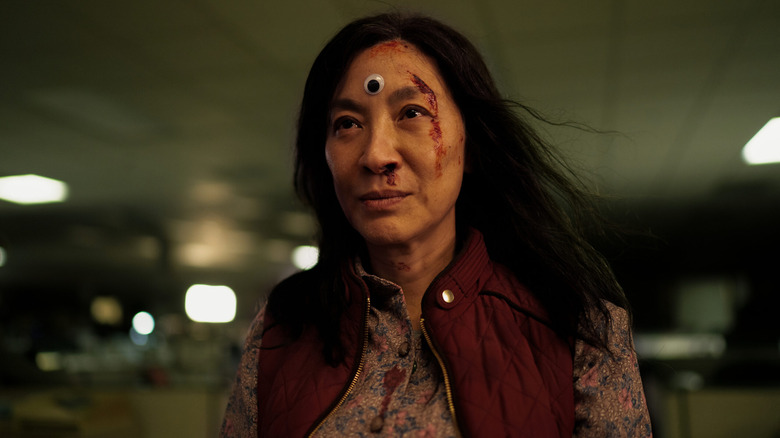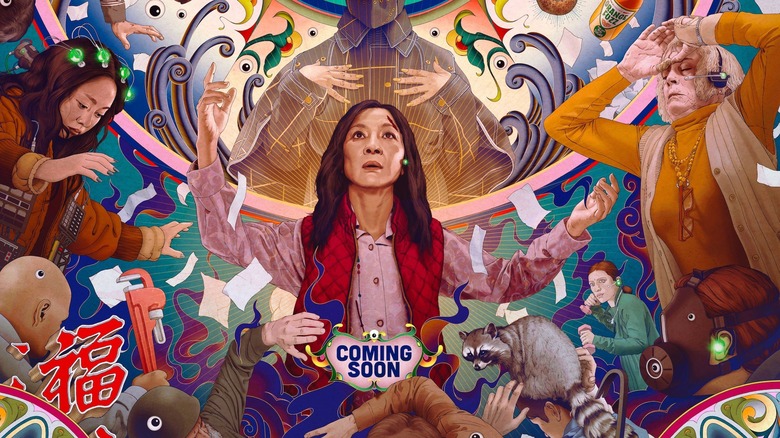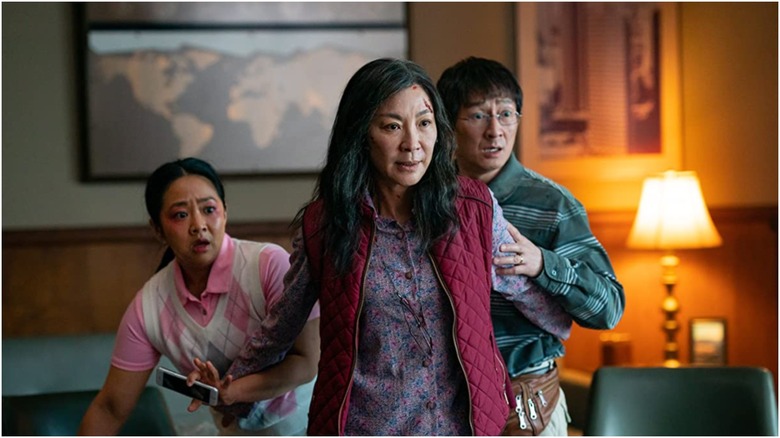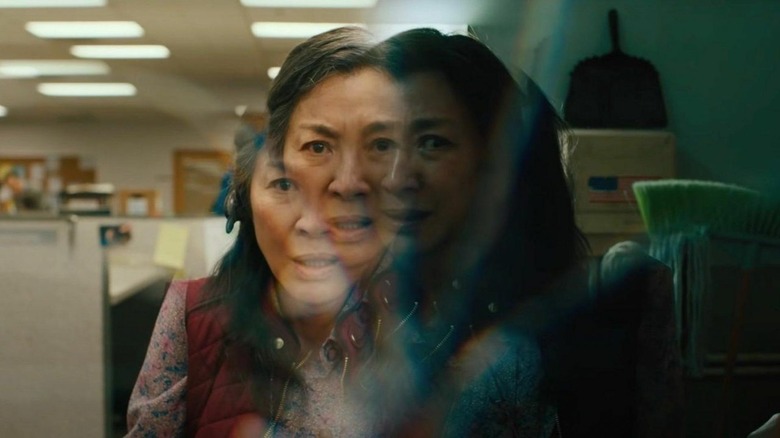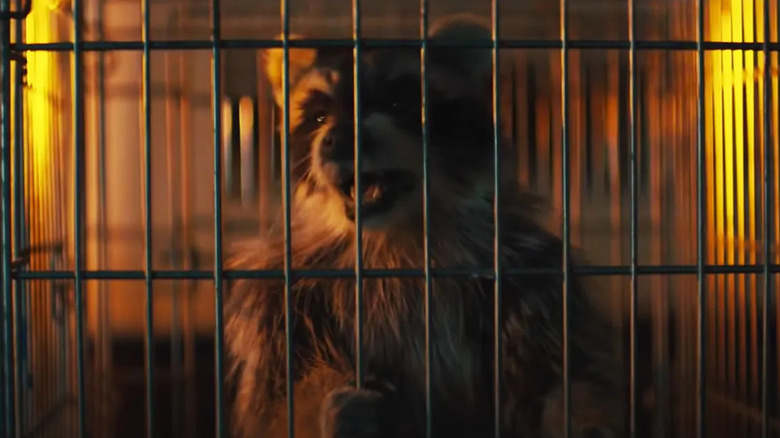Everything Everywhere All At Once Composers Son Lux On Their Epic, 49-Track Score [Interview]
Son Lux's score for "Everything Everywhere All at Once" is not lacking in scope. As the band told us themselves, there are over 100 music cues in the film, each of them capturing limitless emotions and universes. The score is simultaneously maximalist and minimalist, featuring artists such as André 3000, David Byrne, Mitski, and Randy Newman. With their singular collaborators, Son Lux created a score that inspires awe and wonder, even during the more mundane moments.
Directors Daniel Kwan and Daniel Scheinert, better known as Daniels, have long been inspired by the band, which began as one of Ryan Lott's solo projects before he joined forces with Ian Chang and Rafiq Bhatia in 2015. The trio spent years working on the score for "Everything Everywhere All at Once" — unlike most composers (who are hired during post-production), Son Lux was already hard at work before production started.
We sat down with Lott, Chang, and Bhatia band talked to us about their experience scoring the film, writing naive melodies, and what it's like to collaborate with Randy Newman.
'One of our little tricks was to have very short, melodic themes'
A lot of composers often have a few weeks, maybe a few months to compose a movie. You had years, right?
Lott: Two or three years.
For a 49 track score, where do you start?
Chang: Funny story about where we started was that there was a very specific task that we had to score, a very specific cue or song that we had to write before some filming that needed to happen. It was basically the musical that you see on the TV, in the laundromat that happens in the beginning of the movie. Later you see it again with hotdog hands [universe]. I think the references they gave us for it were like "King and I," a very sort of traditional musical but almost silly. So that was the first thing that we were tasked with writing for this movie, which is a pretty funny first thing, because it was musically unrelated to everything else in the movie.
Bhatia: Also for the music the three of us make together, it literally couldn't be further from what we usually do.
Chang: But the fun thing about it was we were, and the reason why we had to do it so early on was because they needed the song in order to shoot that scene. The actors were singing it on screen. That was the one day the three of us were able to go on set and meet a bunch of the cast and experience just the world that was shooting that film for a day. Literally the day after that COVID locked everything down, and that was the last day of shooting for the film.
This is a movie and score with all these different pieces and tones that come together beautifully. Musically, how'd you want to make these wild elements and sounds one cohesive piece?
Bhatia: Well, that was actually an early directive from the Daniels or an explanation of when we first had a conversation with them. They explained to us that the reason why they were interested in working with us was because of the music that we make together as Son Lux. It is a lot of disparate seeming elements into something that feels cohesive.
They also noticed that each of us individually in our own solo work seems to be interested in that and approaching it in different ways. And they knew that for this film, there were so many universes and there were going to be so many changing channels happening that it would be important to establish clear sonic identities for each universe.
Like you were saying, each one would have its own kind of tone where, you can just tell from the sound, color and all that sort of stuff, right away that we're in this world. And okay, now we've changed to this one and they were sort of talking about it as being something that would feel almost like flipping channels at first where they would be really unrelated to each other, but eventually these seemingly disparate worlds would cohere into something that had both a logic to it and the emotional weight to it. And so, that was the very tall order that they gave us to approach the score with.
How'd you approach some of the universes differently? Musically, were there any rules?
Lott: I think in each case we're not just scoring a universe, we're scoring relationships and we're scoring characters. We're following the same characters in a way through different universes. And so, one of the things we did is we followed the same simple themes through different universes. Re-contextualizing small melodic ideas. And that helped a lot to bring unity between them.
One of our little tricks was to have very short, melodic themes that were shorter than I would say your average main theme for a film, because oftentimes we wouldn't have the time to convey a broader theme, a broader melodic theme. It was about finding instantly recognizable melodic ideas, and then contextualizing them instantly with either idiomatic genre, nodding instrumentation, or orchestration, or doing the exact opposite, positing them in a world of sound that feels very strange, very alien, or flirting between sound design and score, where the particular "instruments" involved are not really recognizable instruments.
'It's just this big, wide open embrace, it's just full of heart'
What were some of those not instantly recognizable instruments you used?
Lott: We do a lot of recording and sampling early on in the process, in our work as a band, but also definitely on this film score as well, just capturing a ton of audio and fragments of performances, and then using that as raw material to make playable virtual instruments.
Chang: One sound that was used somewhat often in terms of percussion was these Chinese drums called Paigu. They're these tuned Chinese drums. We did a sampling session for that. This was also like right before COVID shut everything down, and we were able to be in the studio together. We did a lot of sampling of that, a lot of sampling of a bunch of different tuned gongs as well.Those Chinese drums were used mainly as percussion, the way that you would use them, but also chopped up and processed in different ways. But the gongs were used as gongs, but Ryan also made an almost synth sounding instrument using them. And that was used quite a bit in a number of different cues.
Lott: There's that Claire de Lune scene where I played essentially a version of Claire de Lune on tuned gongs that were built from that session.
Bhatia: Some other fun sounds that we used a bunch in the score, there was this foil violin that we sampled.
Lott: Yeah, basically a violin has been extremely f***** with, or played with crazy things that you wouldn't want to touch a nice violin with. We worked with our friend Hajnal Pivnick for a couple of those sessions, just developing super interesting raw sonic material. The most extensive sampling session we did was actually with André Benjamin who's best known as André 3000 from Outcast. He's dedicated recently his life to learning to play these different kinds of flutes. But in particular, these recreations of Mayan flutes.
Bhatia: Typically made out of clay.
Lott: Yeah, but they're wooden.
Bhatia: Cedar, mostly, but it was different woods, but he said that the Cedar ones, the wood was softer and that gave him the kind of timbre he was into.
I think it's really cool how he's still experimenting, even if he's not releasing albums.
Lott: We had the exact same feeling. We were like, man, this is so cool. This dude is just quietly, but also weirdly, publicly learning this stuff and spending his private and public moments with these instruments.
Bhatia: I would just say that it's a lot more than an experiment. He is really deep in this.
Lott: Right. But I was saying, that's what we thought at first, we were like, wow. It would be really interesting to ask has he ever recorded these or, I wonder if he's serious enough about it to be interested in recording, so we reached out to him and were just super lucky. We have the same film agent and he was just talking to him about how he wanted to get into playing on scores. And so, we got connected that way. When he showed up, we basically learned just how incredible and dedicated to these instruments that he was.
"Claire de Lune" is not ironic in the movie. Given the sincere tone of the movie, how'd you want to avoid irony in your version of it?
Bhatia: Well, first of all, "Claire de Lune" was actually an idea from Daniels because they were just thinking about Jamie Lee Curtis's character, Dierdre Beaubeirdra, and we're like, wow, this is such a normal character, it's an IRS agent. They were trying to find something that where you could inject this Supreme normalcy into it. But then that we could take that melody in the fashion that Ryan was talking about and view it with the suspense of the action universes or the sweetness of the relationship between Jamie Lee Curtis and Michelle Yeoh's characters, but that piano scene where the song is really articulated fully for the first time was something that, when I was working on shaping it, I was following another directive from Daniels, which was that the music in most cases in this film needed to try to earnestly convey that their love was serious and sweet.
I got so inside of that, trying to really make the music feel sincere that I had forgotten that it was funny until nine months after we finished the project and we went to the premiere to see it in a theater full of people. It was the first time that I remembered how hilarious it was because I had to suspend my own disbelief working on it.
Chang: And the sincerity is what makes it funny, I think.
Since some of the images are already hilarious, did you not feel the need to play up the comedy? For example, the hotdog finger universe, it sounds like a relationship drama.
Chang: Exactly, yeah.
Bhatia: There's this moment where she puts her foot to caress Evelyn's cheek. I have this thing happening and the sound design around the piano where there's this rippling sound. I tried to make it feel as tender and blooming flowers as I could and then seeing it back and realizing all of a sudden how funny it was, that was great.
Lott: You know, that's the thing that this movie does so amazingly well. There are departures into absurdity, but there's never departures away from something really beautiful at the core. And ultimately that relationship and the way that Michelle's character, Evelyn leans into that parallel universe relationship in order to issue a redemptive life giving decree to her in another universe, is something that is profound. It's something that if we were to play it comically, we would undermine what is really happening under the surface in this movie, which is that it's just this big, wide open embrace, it's just full of heart.
'There's a hundred music cues'
How did some of the film's themes influence the short, melodic themes you created?
Lott: I think the early in the early stages of working on this movie is where we came up with the themes, the melodic themes. There was maybe one theme that came later, which was Jobu's theme, which was one that Rafiq wrote. For the most part, the melodic themes that we came up with for the movie were in response to the story, in a broad sense. And for that reason, it felt very natural to write melodies that were kind of naive and lent themselves well to something more tender and sweet. I think naive is actually a good word on the surface of these melodies. There's no complexity to them.
There's a simplicity, a kind of plainsong aspect to them, and that also made our job a lot easier later because as we were casting these melodies at different lights, they didn't have too much information in them that leaned in one particular direction or the other, or too much shape or contour. They were simple enough that they could be portable into different universes and be effective based on the context, the orchestration, and the instrumentation.
Rafiq, how did Jobu's theme evolve as you worked on it?
Bhatia: That was a really interesting process because in talking to the Daniels about it, as we were working on those scenes, they said, "We don't want it to seem menacing or usual villain music, and in fact, we're trying to see if we can convey that Jobu is almost like a cult leader, where there's a 'having all the answers' optimism, but that there's something really creepy about it at the same time." There was an instrument that is used a lot in the score, it's a guitar that I'm playing actually with a processing on it that shifts it up two octaves in pitch, and it has this portamento thing. We use it to activate this big reverb. And so, I was in that zone and a thing that's nice about that world is that up that high dissonance reads differently, you know? And so, you can have things that are actually weirder and they seem more consonant than they are.
While we were working on that, we pulled in a collaborator of ours who also happens to be my fiance now, Nina Moffitt. She's an incredible vocalist and able to shape melodic ideas in a way that even a sustained note can be a platform for her to create a whole timbral envelope out of. It's almost like an instrument approach to using the voice. She did these wordless vocals on it that were creepy, but they were childlike at the same time. It straddled this line between Jobu's character having an innocence and a simplicity, but also an underlying weirdness.
When I talked to the sound team, they said they were very much responding to the pace of your score, the rise and falls in it. Is that how you imagined it from the beginning or how they interpreted it?
Chang: I think that was inherent in the film. Through the task of scoring, it was difficult for us sometimes to see the big picture of everything when we're all going scene by scene and working that way. Well, I know Andrew is also scene by scene kind of meticulously putting sounds together, but in terms of mixing, Brent and Alex, I think they were able to see a bigger arc and I think the story itself and the way that we were kind of directed by the Daniels to score it, gave it a natural ebb and flow because a lot of the times we're working on it, we're just like, "I hope this all reads when it is washed down together."
I have to say that when we recently got to watch it a couple times at certain screenings, I was pleased with how Unbridled Sound and the sound team really shaped it, in a very macro sense. There are so many moments in this movie where there's these crazy, like swells, you know what I mean? Where you see all the different universes flashing. There's, I don't know, probably five or seven, eight moments like that in the film. When we were working on it, we were just like, okay, it's another crazy swell, let's make it. But then they really mixed it in such a way where I would say there's two of them that are true peaks in the movie and the other ones are not as crazy.
It kind of gives the whole thing a shape that is something that, at least I personally wasn't necessarily super engaged with that thought process. Especially because we were cramming to get all the music just done by the time we were at the mix stage, because there was so much music to make.
Lott: There's more music in the movie than is on the soundtrack, which is insane because the soundtrack is 49 tracks long.
Chang: There were a hundred cues or something like that.
Lott: There's a hundred music cues. There's a little bit over a hundred music cues and all but I think five of those are original music cues. It's the craziest thing. It's like scoring at least three movies. I think it would've killed us if the movie wasn't so magnificently nurturing as a thing to continually be feeding on essentially. This process was grueling in one sense, but it was also very nourishing, I think as a creative team, the three of us and across the distance because we were all in different cities and it was COVID and everything. So, and then to be able to engage with the Daniels, at least once a week for hours to work on this and to winnow out what would become the score from nothing. And to learn so much in the process was an inexplicable growth moment, I think for us, collectively and individually.
Chang: I can't overstate how involved the Daniels were in the process, in terms of reviewing the cues week by week and giving us extremely insightful notes and speaking to sort of what you're talking about with shaping the art of it. They were definitely instrumental in that, for sure. And not to mention that they also contributed to the music in the movie directly in some ways, one of which is Daniel Kwan.
You know the scene where they're talking about the origins of the hotdog hand universe? You hear the "2001" music, but played on trumpet, really badly at that moment. It's Daniel Kwan playing trumpet. Originally, we were talking about maybe finding a children's orchestra to butcher the song and that would be perfect for that scene. But there were just so many things to figure out and problem solving that we never got around to it. We were like, "Wait, but Daniel, you played trumpet, but you haven't played in a long time. Would you still have access to a trumpet?" He totally went for it and created the perfect thing for that scene. So that's him playing trumpet on the score.
'It was the Daniel's dream that Randy Newman would voice Raccacoonie'
Even though it's almost wall-to-wall score, which scenes did you want silence or quiet? Say for the emotional parking lot scene or the alleyway in the moviestar universe, am I wrong or is there not much music there?
Lott: That was a big puzzle that needed to be solved. How can we have so much music and never get in the way? I think that the Daniels deserve a lot of the credit here because they were always careful to be extremely concerned with the music and super focused and detailed about reviewing and getting really nitty gritty with all of the details with the music and making sure everything that they were hearing was working for them, but then being able to stepway after all of that work and guide the mixed process so that some of that detail and integrity that's built into the score, winds up becoming either inaudible or not even there because of the broader story that needs to be told.
And that's part of the scoring process as well, which is designing something that may not be heard. It's like when you hear about Steve Jobs and how he insisted that the inside of a computer be beautiful, even though no one was going to see it. think that there's a level of scoring that is definitely going to be audible on the soundtrack album, which is out when the film goes wide this Friday. There's a level of detail there that is of course lost in the broader mix of the film, which involves so many millions and millions of layers, especially a movie like this. But there is also something to be said about the integrity that deep process of detail brings that I do think is truly felt.
I think that goes for music. I think that goes for production design, the equivalent would be the kind of production design that is very detail oriented, but that winds up out of focus in the background. It's tons of that. There's also versions of that with score. And so, my guess is there are moments in your memory where you think back and you're like, oh, there wasn't a score there, that where there likely was, yeah. In this two hours and 19 minutes, there is one hour and 50 minutes of original music. So there's basically no time when there's no score.
Bhatia: And that also serves to make those moments where there really isn't score extremely consequential. You really feel it when it's actually not there.
Chang: So the parking lot is one.
Bhatia: The parking lot is a great example. One where for the moment there isn't any music and then the rock scene obviously is silent for a bunch of it. There's music most of the time for sure, but when there's a gap, t's a greater impact in terms of the quiet.
To conclude, how do you write for Randy Newman? How surreal was that collaboration?
Lott: That was extremely surreal. It was the Daniel's dream that Randy Newman would voice Raccacoonie. I got the sense that if they didn't get Randy Newman, that those guys would probably do it themselves. They're such a DIY crew and it would've been great. But again, attention to detail. Here's a character that has just this small number of lines, very short, where they could have gotten away with doing something less than their big dream. Instead they aimed to knock it out of the park and they sent the film to Randy Newman and he watched it with his whole family and said that his wife had not laughed so hard the entire pandemic and that he was up for it. The scene in which he appears kind of longest is an homage to Pixar, like a jump into a version of a Pixar universe that isn't animated, though.
The raccoon is an animatronic raccoon. The raccoon and a chef are singing a song together and on camera, they sang basically one phrase. From that one phrase, this was a cue that I took lead on. I had the weird task of taking their mouths, singing this one phrase, write a slightly different melody and then explode that into a full song of which we hear only in a very small part of the film, but then the big dream was, well, if Randy's coming in for ADR to do these few lines, we have to have the song ready for him to lip sync this or for it to sync up with this one phrase.
If he's sitting there, he's on the mic, you got the skeleton of the song, my idea was, what if I wrote a whole song? While he was there, we had him record the whole song and sure enough, he was up for that. That's exactly what we did. It's an exclusive to the soundtrack, a duet between Randy and I. We exploded it into a full song with a band. Essentially. I never, in a million years, would've dreamt that I would somehow wind up singing a duet with Randy Newman, a song that I wrote in the style of Randy Newman. That was only something that the universe of this movie could make possible. It definitely did.
Bhatia: Another thing I just want to add to that is, Randy Newman did some amazing ad-libs that appear in the movie, but if you're not really paying very close attention, you'll easily miss them. Anytime you see the raccoon on screen, just try to listen to Randy Newman's voice, because he's killing it with hilarious ad-libs, like, "No Chad, don't forget about me." You might not be able to hear it over the audience's laughter. Even though I'm listening for it, I can't hear them because people are laughing too hard in the scenes that he's in, but yeah, it's remarkable. That was some of the later stuff that we were doing on the film, placing his ad libs in different spots. We were just laughing so hard.
Chang: Those are cherished audio files on the hard drive.
Lott: I'm never going to be able to use any of them, but I will also never delete them.
"Everything Everywhere All at Once" is now playing in theaters.
